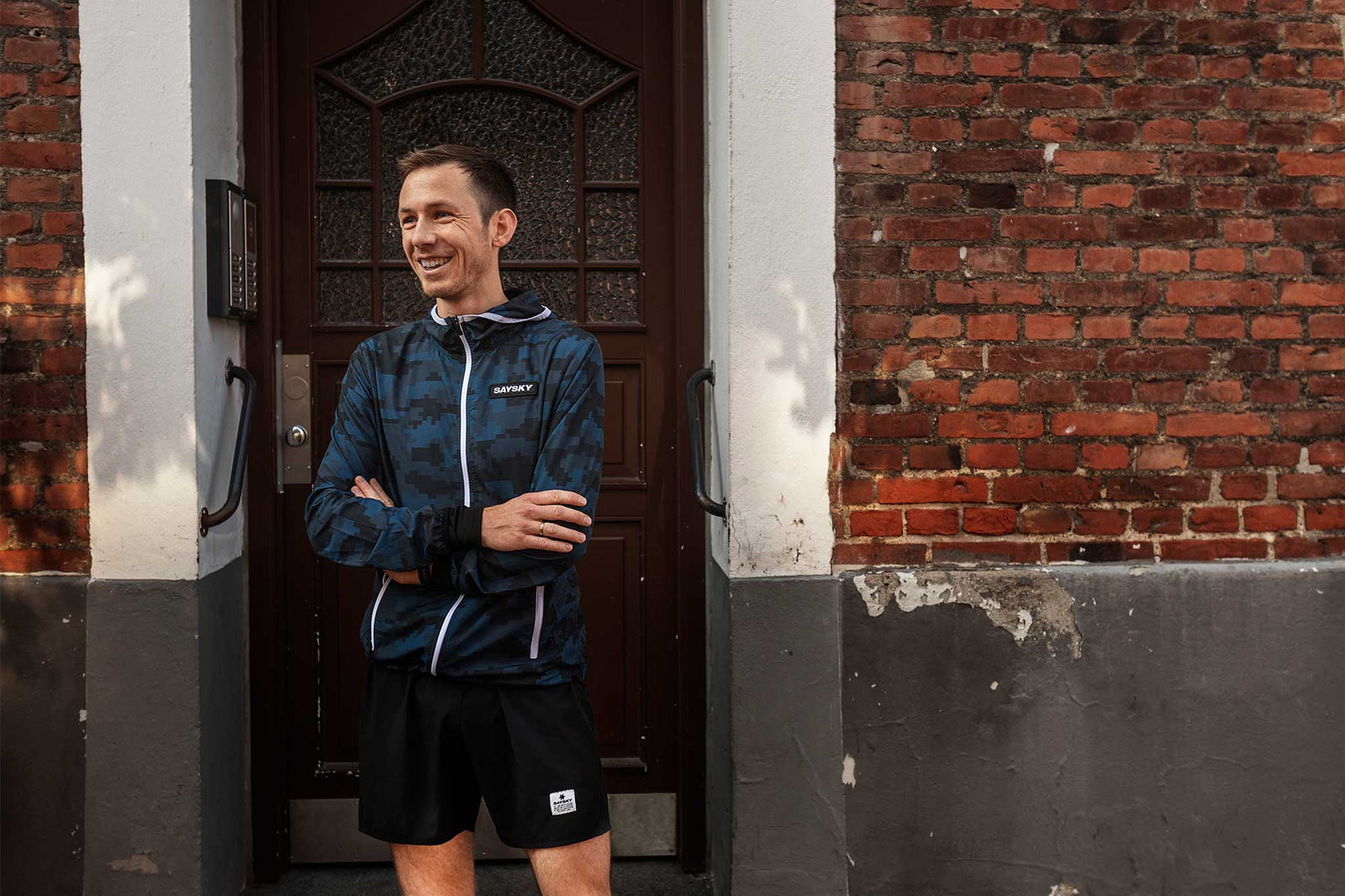
How to juggle everyday life and elite running ambitions?
Simon is the current Danish national marathon champion and very soon he’ll be off to the World Athletics Half Marathon in Gdynia, Poland on October 17 – representing the national team for the first time. We had a talk with Simon about his training ambitions and what it means to have a family, full-time job and run at an elite level at the same time.
Watch the video with Simon below or scroll further down for the full interview:
What are your expectations for the upcoming world championship?
To attend a World Championship has always been a dream – to run for your national team and represent my own country. So, my expectation is to have a great experience. To aim for a certain position doesn’t really make sense at this point. To me it’s all about the experience, because this is something nobody can take away from you.
It’s also just about getting out there and run fast. The route is going to be a bit hilly, but if it’s a good day, then I should be able to finish below 64 min.
So, to you it’s more about the experience than the actual result?
Yes – it’s to try and run a race with a huge international setup.
How do you see the future?
I looked at my birth certificate, and it tells me I’m 34 years old, turning 35 next year. So, it’s a good thing I’m not sprinter, or running shorter distances because then it would be hard to compete at this level, I think.
But as long as I still keep developing, and I manage to also juggle work, and my family then my plan is to continue to give it all I got. But I also believe that the day where I don’t improve anymore, and someone comes from the sideline and overtakes me that’s the day where it’s time to retire.
How do you train for a race? For example, The World Championship?
My training in general is structured by my trainer, and I have a program I follow. I’m also in a training group with my teammates, and here we have a training guide targeted at the World Championship. This program I try to follow as much as possible, but of course all kinds of force majeure can occur. Perhaps it has been a really bad night, someone in the family is sick, or I don’t really think my legs are up for it that day, and then I run another workout. But everything right now is planned around peaking at the World Championship.
How do you plan the many kilometers you have to run (at the moment 140 km a week)?
I try to think running into many of my daily activities. If I have to drop off my daughter at kindergarten, I run. In the beginning I always rode my bike, but then I started to realise that even though it’s only 2 kilometers, it’s 2 kilometers I’m wasting. So, I thought - why not run, when it doesn’t take longer? I put her in the baby jogger, run to the kindergarten, drop her off, and run back home again.
I basically try to run to as much as possible. If somebody has some sort of errand – a package, milk or diapers that need to be bought, I’m always saying, ‘I can do that’ and then I put on the running shoes. I try to fit my selfish training into my family’s everyday life and activities.

How do you stay motivated?
How I stay motivated is something I’ve been thinking about a lot lately because I think my motivation has changed since I started running.
When I started running my motivation was primarily aimed at my own ambitions, and the battle against myself - I didn’t really look at other people.
Then I started in a running club, and I realised that there were people I could compare myself to. Because when I was running alone, I just knew I wasn’t the best or second best in Denmark. So, it went from being a battle against myself to a battle against the people I was training with.
At one point I reached a level where I could start to count the number of people in Denmark, who were faster than me on a certain distance. This meant my motivation was driven by comparing my own results to others’. In some ways this change removed the innocence of running because now, I not only evaluate and compare my results to myself, I also evaluate and compare it to others. If I make a great performance, but realise that someone ran much faster than me, I can’t help but to compare myself and regret.
In regard to the World Championship, my motivation is driven by the training, and the whole process towards this race, and hopefully I will succeed with my goals. If this happens, I will enjoy my achievements, and if I don’t succeed I will of course regret, but then set some new goals to stay motivated.
During Covid-19 it has been difficult for me to stay motivated, because all runs have been cancelled. Every time I saw a race being announced I thought, ‘YES this is what I’m aiming for and working towards’ and then the race has either been postponed or cancelled. So, my motivation has really been lacking during this period. But in return I have been able to enjoy my training in a new way due to the continuity.
What if you have an off day - do you still run?
It sounds like a cliché to say, but to me running is meditation. It takes my mind off things, and before I started training seriously this state of mind was my motivation for running. If I was mad or frustrated, I would always go for a run and come back feeling much better.
Even now, I always come back in a better mood than I was before. If I had a bad workday, or things just didn’t go my way running always help – and this I think is important. Because nothing is worse than having a husband and a father who spends a lot of time running, and when he comes back, he’s still mad and frustrated – nobody deserves this.
So how does running contribute to your life?
Running has brought me many unique experiences. I never thought I could become Danish National Champion, like I did last year, and I often look back at this moment. I’m sure it’s something I will keep looking back at many years ahead. But running also gives me a community, and I’ve made a lot of good friends through running.
I also use running as a way of exploring. If I’m on vacation, or on a business trip, running is a way for me to explore new places in a different way.
What would you say is the greatest thing about running?
The greatest thing about running is the freedom – it’s something you can do everywhere, and it doesn’t require much. And then I simply just love the sport and the training.
Why do you keep running?
I keep running because I still have some goals I want to achieve. It has been my dream for many years to one day represent Denmark and the national team. This goal has kept me going, and now I’m starting to see it happening, and this has been a huge motivational driver. Because of this dream, I have been able to work hard and dedicated, and sacrifice other things.
Besides this, I keep on running because I still enjoy it. I believe I will keep on running as long as I can still see progression. If a day comes where I can no longer see myself improving, then I will reconsider the way I’m training. I will prioritise running with other people, and just relax and enjoy running instead of constantly focusing on certain running times and kilometers per week.
So, when there’s no more for me to achieve, when age is getting to me, or younger people are starting to pass me, then I think it’s time to change the way I’m running.
What are the biggest challenges you are facing when running at an elite level, having a family and a fulltime job?
There are many challenges to all of this. When I’m thinking back to when I started running 8 years ago where I didn’t have any kids, no girlfriend, and I was just studying… Well at that time I thought life was busy. But looking back now, I can’t help but to think young-Simon sure had a lot of free time and no commitments at all. All the sacrifices he made were only in regard to himself.
Of course, I still sacrifice a lot personally, but now my family also sacrifices a lot when I have to go running 1 hour to 1 ½ hours every day.
The biggest challenge for me is to find the time. I still want to spend time with my kids, my wife, I have commitments at work, and then I have this big selfish project where I have to put in 7-10 hours of training every week (which is what my training demands at the moment). It’s not only my own sacrifice - it’s my family who is sacrificing as well. So, the support I get from home means a lot. Otherwise I couldn’t do this.
What does your family say about your ambitions?
On one hand they are really proud because they think I’m doing a great job. They can tell how much it means to me and how much effort I’m putting into it. They know I come home being a better dad, and husband because I get to achieve this ambition.
But on the other hand, it also means there are times where I can’t be home as much as I want. This is also why I really try to limit the time away from my family, by planning my training around our family schedule.
How strict are you when it comes to your training – would you say no to a family trip for example?
I try, as much as possible, not to give up on any family time. I always try to be a part of everything. The last couple of years I would always go running whenever my daughter was sleeping. Here, I felt I had the time, and I could run with a clean conscience.
Now it’s a bit more difficult because our oldest child doesn’t take a nap anymore, and now it’s the youngest who determine when it’s time to run.
So, you wouldn’t give up a kid’s birthday to go out running?
No, I would never give up a kid’s birthday. For example if it’s my mother in law’s birthday, and we are visiting her for an entire day, then I just bring my running shoes. Because chances are some people are going for a walk, and then I have 45 minutes to go for a run instead.
Keep up with Simon Holbek Kønigsfeldt here: Strava and Instagram.

